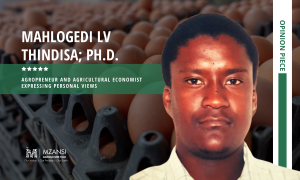Part 2: funding models for black farmers

Internationally renowned University of Limpopo academic Prof Mokoko Sebola continues to expand further in part 2. Prof Sebola has appeared in over 500 citations and is credited for producing thought leaders in the fields of economics, development, corporate governance and public administration. Ever frank and elaborate, his research titled Financing emerging black farmers for agricultural development in South Africa: A wasteful and unworkable model for creating black farmers, offers an interesting past, current and future deliberation. Did government throw money at the problem and are there alternatives to this quagmire?
Given the scale of agricultural lands that now have laid fallow over the past years, and in the absence of a reasonable and credible explanation, there can be no suggestion that the funding was “value for money.” Furthermore, almost 20 years after the implementation of various measures to restructure agricultural farming and to create a cohort of Black commercial farmers, the sector remains predominantly white; and, the current status quo cannot be regarded as a success story because the intention was never to enforce change of hands that control agricultural land for its own sake.
Is it possible to restructure the apartheid agricultural land patterns without disrupting the productivity of the sector? I fervently believe that there is a path to such an outcome.
In a democratic South Africa, though, the simplest alternative would not be the most effective; and, the reasons thereof are captured in the explanation in the previous article. A simple conclusion could be drawn that funding should be made available to Blacks who have interest in agricultural farming, who have expertise and who have experience. Notwithstanding my argument in the paper, such a simplistic deduction would equally not succeed; instead, vexed questions should be framed to ensure that an artificial creation of interest, expertise and experience among Blacks may not become a cul-de-sac.
Remember that I said the societal environment, social perceptions, “knowledge of Practice” and market are not “enabling” for the creation of a cohort of Black commercial farmers. It could be that the slogan, “Make Agricultural Farming fashionable,” captures the essence of what needs to be done. However, sloganeering in a democratic South Africa have remained just that, sloganeering. It would be impossible to repair the consumption patterns to render them amenable to the patience that is required in agricultural farming.
Also, there is no life span that could be created to ensure that Blacks grow up in agricultural farming families in order to acquire the “Knowledge of Practice,” because such Black agricultural families are virtually non-existent. Am I answering the question of an alternative? Yes:
South Africa has to recognise that agricultural farming is not amenable to overnight success and that it requires patience. The current philosophy underlying the South African pursued for national development is founded in the “get rich quick scheme” and that is the locus of the problem that requires repair. South Africa requires a development philosophy that is grounded in disciplined hard work; and, redress of the apartheid agricultural farming patterns require a long-term concerted interventions in training cohorts of youthful Blacks who would then be attached to identified agricultural lands, as part-owners, as a way of their socialisation into the career path of farming.
This alternative implies that it is unproductive to fund persons who have no interest, experience nor expertise, and that there exists no life span that can be created for persons who had experienced agricultural farming de-skilling, and that funding should be governed in the same manner as a person would plant a seed or nurture calves and patiently await the end product, with the knowledge that such product is not in itself the end of the struggle. The state itself should accept that it would take decades to redress the damage caused by apartheid, but that funding interventions that are poorly informed are equally damaging.
However, that socialisation cannot be engineered through frustrated funding interventions where lands were transferred without their productivity being sustained. In the alternative, the funding would also emphasise securing of markets; and, there are more minutes’ details that would be entailed; and, these would require commissioned studies that depart from the past intellectual sloth that was designed to be pleasing in the eyes of the politicians.
Whereas the pool of targeted beneficiaries has increased exponentially, the funding has grown arithmetically. Also, the problem has been that the range of matters to be addressed through funding have become wider than previously because once a cohort of farmers is created and socialised into a family system as a mode of societal reproduction and refreshing of the nation, the strategic system becomes cheaper and sustainable.
For now, a democratic South Africa had merely been advised to through money at the problem without having adopted a well-informed and pragmatic strategic plan that is acutely sensible of the need for enabling national development environment and philosophy.
By Prof Mokoko Sebola (Acting Director of School of Economics and Management) University of Limpopo
Disclaimer: The views and opinions expressed in this article are those of the author. They do not purport to reflect the opinions or views of Mzansi Agriculture Talk or its members.



















